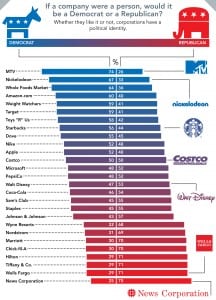▶ Politicians Can Learn From Forward-Thinking Business Leaders: Politicians who fail to act with long-term interests in mind can learn from forward-thinking business leaders, according to the recently released Ketchum Leadership Communications Monitor study. Sixty-one percent of people around the world see business leaders as focused mainly on the long-term, countering stereotypes that corporations are obsessed with the next quarter’s profits. Business chieftains also got good marks for taking responsibility when things go wrong.
Politicians, by contrast, trail behind all other leadership categories on both measures —60% of those surveyed view them as short-term focused – suggesting that the world of politics has a lot to learn from the business community. Other findings include:
• Despite attaining the highest scores in almost every area, business leaders still have ample room for improvement. Of those polled, only 34% view business executives as effective leaders and just 35% believe they are effective communicators.
• Business leaders experienced the largest drop (13 points) on open, transparent communication— the number one leadership attribute for the second year running – with leaders overall seeing a 24% drop in their communication score.
• Poor leadership communication is directly affecting corporate performance and sales. In the past year, 60% of people stopped buying, or bought less, from a company due to poor perceptions of the behavior of those executives in charge.
• Overall, one in four respondetns said leaders in general demonstrated effective leadership; but there is a 21-point gap between expectations of leaders and their ability to meet them.
Source: Ketchum
▶ Teens Take to Mobile to Surf the Net: Smartphone adoption among American teens has increased substantially and mobile access to the Internet is pervasive. One in four teens are “cell-mostly” Web users, who say they mostly go online using their phone and not using some other device, such as a desktop or laptop computer.
These are just a few of the nuggets from a national survey by Pew Research Center exploring technology use among youth ages 12 to 17 and their parents. Reaching these teens will be a challenge for communicators, particularly those who have yet to ramp up their mobile outreach capabilities. Key study findings include:
• 78% of teens now have a cell phone, and almost half (47%) of them own smartphones. That translates into 37% of all teens who have smartphones, up from just 23% in 2011.
• 23% of teens have a tablet computer, a level comparable to the general adult population.
• 95% of teens use the Internet.
• 93% of teens have a computer or have access to one at home. Seven in 10 (71%) teens with home computer access said the laptop or desktop they use most often is one they share with other family members. PRN
Source: Pew Research Center
Political Perceptions of Brands
Global Strategy Group asked the public to identify the politics of specific companies as though they were individuals. Note that corporations in certain sectors tend to be assigned particular political leanings. For example, hospitality brands surveyed—Hilton, Marriott and Wells Fargo—were identified as Republican, while youth-focused. media and entertainment companies MTV and Nickelodeon were perceived as Democrats, as was “green” grocer Whole Foods Market.

